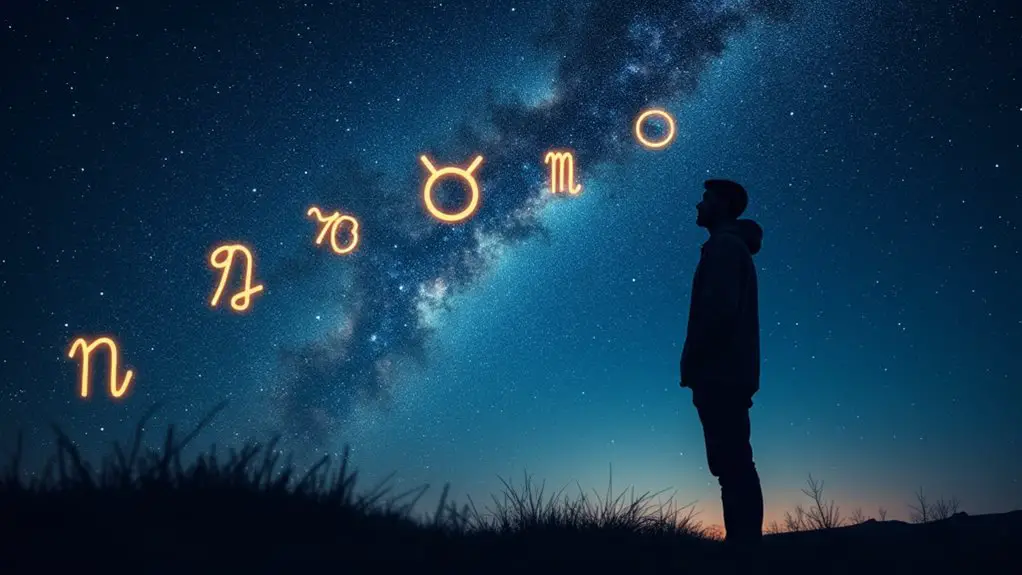Do astronomers believe in astrology? You might be surprised to learn that these two fields, although often confused, have distinct differences.
In this article, we’ll explore the historical origins of astrology, its influence on ancient cultures, and the skeptical views of astronomers.
With a scientific lens, we’ll delve into the reasons behind astrology’s appeal and its place in the scientific community.
Join us as we navigate the intersection of astronomy and astrology, seeking a deeper understanding of the universe.
Key Takeaways
- Astrology has historical origins dating back thousands of years and has played a crucial role in ancient civilizations.
- Astronomy is a scientific discipline based on empirical evidence and scientific methods, while astrology is a belief system lacking scientific rigor.
- The position of celestial bodies at the time of birth influences the astrological chart and can affect personality traits, emotions, and life experiences.
- Astronomers largely debunk astrological claims and emphasize critical thinking and evidence-based reasoning.
Historical Origins of Astrology
Did you know that astrology has its historical origins dating back thousands of years?
Astrology, with its historical significance, has been an integral part of cultural practices throughout history. From ancient civilizations like the Babylonians and Egyptians to the Greeks and Romans, astrology played a crucial role in their societies.
It was believed to provide insight into human behavior, predict future events, and even guide decision-making. These cultural practices were deeply rooted in the belief that celestial bodies, such as the sun, moon, and planets, influenced human lives.
While astrology may have been a prominent aspect of ancient cultures, it’s important to note that in modern astronomy, it isn’t considered a scientifically rigorous discipline. Astronomers focus on the study of celestial objects and phenomena using empirical evidence and the scientific method, rather than the interpretation of astrological charts.

Distinctions Between Astronomy and Astrology
You can differentiate between astronomy and astrology by understanding their purposes and methods.
Astronomy is a scientific discipline that studies celestial objects and phenomena, such as stars, planets, and galaxies, using rigorous observation and quantitative analysis. It aims to understand the physical properties and behavior of these objects through the application of physics, mathematics, and other scientific principles.
On the other hand, astrology is a belief system that asserts a connection between the positions and movements of celestial bodies and events on Earth. It’s rooted in cultural beliefs and relies on subjective interpretations to make predictions about individuals’ personalities and future events.
While astronomy is based on empirical evidence and scientific methods, astrology lacks scientific rigor and is often dismissed by the scientific community.
Astrology’s Influence on Ancient Cultures
Astrology played a significant role in shaping the beliefs and practices of ancient cultures. Its historical significance can be seen in the way it influenced various cultural practices, such as religion, medicine, and agriculture.
Ancient civilizations believed that celestial bodies, such as the sun, moon, and planets, had a direct influence on human affairs and could predict future events. This belief formed the foundation of astrology, which was used to determine everything from personal characteristics to the outcome of battles.
Cultural practices were heavily influenced by astrological beliefs, with rituals and ceremonies often conducted in alignment with celestial events. Astrology provided a framework for understanding the world and one’s place in it, and its influence on ancient cultures can’t be understated.
Understanding these historical roots helps us appreciate the cultural practices that have shaped our society.
The Role of Celestial Bodies in Astrology
The position of celestial bodies at the time of your birth directly influences your astrological chart. This chart, also known as a horoscope, is used to predict various aspects of your life, including relationships and compatibility.
Here are four key ways in which celestial bodies play a role in horoscope predictions:
- Sun Sign: The position of the Sun at the time of your birth determines your zodiac sign, which is believed to influence your personality traits and general characteristics.
- Moon Sign: The position of the Moon at the time of your birth affects your emotions and inner self. It’s believed to provide insights into your emotional needs and reactions.
- Rising Sign: Also known as the ascendant, the rising sign is determined by the position of the Eastern horizon at the time of your birth. It represents the mask or persona you present to the world.
- Planetary Aspects: The relationships between different celestial bodies in your astrological chart, known as planetary aspects, are believed to influence your life experiences, relationships, and overall destiny.
Understanding the role of celestial bodies in astrology can provide valuable insights and guidance for personal growth, relationships, and decision-making.
Debunking Astrology: Astronomers’ Skeptical Views
Contrary to popular belief, astronomers question the validity of astrological predictions based on the alignment of celestial bodies. While astrology has its roots in ancient civilizations and continues to capture the fascination of many, its claims and predictions have been largely debunked by the scientific community.
Astronomers, who study the physical properties and behavior of celestial objects, approach astrology with skepticism. They argue that the alignment of celestial bodies, such as planets, has no significant influence on human personality traits or future events.
Astrology misconceptions often arise from a lack of understanding about the scientific method and the rigorous testing required to establish valid correlations. Astronomers emphasize the importance of critical thinking and evidence-based reasoning when evaluating astrological claims, encouraging individuals to rely on scientific explanations rather than astrology for understanding the universe.
Cultural and Personal Beliefs in Astrology
You might find it interesting to explore the cultural and personal beliefs surrounding the alignment of celestial bodies. While astronomers may not believe in astrology from a scientific standpoint, it’s undeniable that astrology holds significant cultural interpretations and influences personal horoscopes.
Here are four notable aspects to consider:
- Cultural interpretations: Astrology has been ingrained in many cultures for centuries, shaping beliefs and practices related to love, career, and personality traits.
- Personal horoscopes: Many individuals find comfort and guidance in their personal horoscopes, which are based on their birth date and time. These horoscopes provide insights into their personalities and potential life events.
- Astrological compatibility: Astrology also offers compatibility assessments between individuals, helping to navigate relationships based on astrological signs and elements.
- Daily predictions: Some people turn to astrology for daily predictions, seeking guidance on how to approach their day based on the alignment of celestial bodies.
While these beliefs may not align with scientific evidence, understanding cultural interpretations and personal horoscopes can shed light on the enduring popularity of astrology.
Astrology’s Popularity Among Astronomers
It’s fascinating how astronomers, despite their scientific backgrounds, are still drawn to the popularity of astrology. While astrology and astronomy are often grouped together, it’s important to recognize that they’re distinct fields.
Astronomy is a rigorous scientific discipline that studies celestial objects and their properties, while astrology is based on the belief that the positions and movements of celestial bodies influence human behavior and personality traits. Although astronomers may find astrology interesting from a cultural or historical perspective, it has no scientific basis and isn’t considered a legitimate field of study within astronomy.
Astrology’s influence on modern science is negligible, as it lacks empirical evidence and can’t be tested or replicated. Therefore, astrology doesn’t impact astronomical research, which is grounded in rigorous scientific methods and empirical data.
Astrology as a Tool for Self-Reflection
Astrology can be seen as a tool for self-reflection, offering a means for individuals to gain insight into their personalities and behaviors. While astronomers may not endorse astrology as a scientific practice, they can appreciate its potential for self-improvement and psychological insights.
Here are four ways astrology can be used in this context:
- Increased self-awareness: By exploring their astrological birth chart, individuals may gain a deeper understanding of their strengths, weaknesses, and motivations.
- Identifying patterns: Astrology can help individuals recognize recurring patterns or themes, providing an opportunity for personal growth and change.
- Relationship dynamics: Astrological compatibility can offer insights into the dynamics between individuals, helping to navigate and improve relationships.
- Personal development: Astrology can serve as a guide for setting goals, understanding personal challenges, and working towards self-improvement.
While astrology may not have a scientific basis, it can still provide valuable insights for those seeking self-reflection and personal growth.
Astrology’s Role in Modern Society
In modern society, astrology continues to play a significant role in shaping people’s beliefs and decisions. Despite its lack of scientific evidence, astrology has gained popularity as a tool for self-reflection and understanding. Many individuals turn to astrology to gain insights into their personality traits, relationships, and life events. However, it’s important to approach astrology with caution, as its impact on mental health and decision-making processes is subjective and varies from person to person.
While some may find comfort and guidance in astrology, others may become overly reliant on it, leading to an unhealthy obsession or dependency. It’s crucial to maintain a balanced perspective and recognize that astrology shouldn’t replace professional help when it comes to mental health concerns.
When it comes to decision-making processes, astrology can serve as a source of inspiration or guidance. Some individuals may consult astrological charts or horoscopes to gain insights into potential outcomes or to validate their choices. However, it’s essential to remember that astrology shouldn’t be the sole basis for making important life decisions. Critical thinking and weighing various factors are still necessary for effective decision-making.

Scientific Explanations for Astrology’s Appeal
You may wonder why astrology appeals to so many people despite the lack of scientific evidence supporting its claims.
Here are four scientific explanations for astrology’s appeal:
- Psychological factors: Many people find comfort and meaning in astrology’s personalized predictions and descriptions of their personalities. It provides a sense of guidance and understanding, which can be psychologically satisfying.
- Need for control: Humans have an innate desire to have control over their lives and destinies. Astrology offers a way to gain a sense of control by providing explanations and predictions for future events.
- Confirmation bias: People tend to seek out information that confirms their existing beliefs. When astrology predictions align with personal experiences, it reinforces the belief in its accuracy.
- Social and cultural influences: Astrology has a long history and is deeply ingrained in many cultures. It’s often passed down through generations and forms part of communal beliefs and practices.
While these psychological factors contribute to astrology’s appeal, scientific research has consistently shown that astrology lacks empirical evidence and scientific validity.
Astrology’s Place in the Scientific Community
If you want to understand astrology’s place in the scientific community, it’s important to consider the skepticism and criticism it faces from scientists and researchers. Astrology’s scientific validity is a highly debated topic.
Many scientists argue that astrology lacks a scientific basis and is based on ancient beliefs and superstitions rather than empirical evidence. They believe that astrology’s claims of predicting personality traits and future events aren’t supported by rigorous scientific methods.
Additionally, astrology’s impact on scientific research is seen as minimal. Scientists tend to focus on more established fields of study, such as astronomy, physics, and biology, where there’s a wealth of evidence and a strong scientific foundation.
As a result, astrology is often not taken seriously in scientific circles and isn’t typically considered in scientific research.
Astrology and the Search for Meaning in the Universe
Astrology can provide a sense of meaning and purpose in the vastness of the universe. While astronomers may not subscribe to the astrological beliefs, it’s important to recognize that astrology holds a significant place in the lives of many individuals. For those who search for purpose and seek cosmic connections, astrology offers a framework through which they can understand the world and their place in it.
Here are four ways in which astrology can provide this sense of meaning:
- Personal guidance: Astrology offers insights into one’s personality traits, strengths, and weaknesses, helping individuals navigate their lives and make informed decisions.
- Connection to the cosmos: By examining the positions of celestial bodies at the time of birth, astrology suggests a connection between human lives and the movements of the stars and planets.
- Predictive tool: Astrology provides forecasts and predictions, giving individuals a sense of control and direction in their lives.
- Symbolic language: Astrology utilizes symbols and archetypes to explain human experiences, providing a framework for understanding and self-reflection.
While astrology may not align with scientific principles, it serves as a source of meaning and purpose for those who seek it.
Exploring the Intersection of Astronomy and Astrology
When exploring the intersection of astronomy and astrology, it’s important to consider the historical relationship between the two disciplines. While astronomy is a scientific study of celestial objects and their properties, astrology is based on the belief that the positions and movements of celestial bodies can influence human behavior and personality traits.
In modern science, astrology is generally not considered a valid or reliable field of study. Astronomers rely on empirical evidence, rigorous research, and mathematical models to understand the universe. Astrology, on the other hand, lacks scientific evidence and is often seen as a pseudoscience.
However, astrology can still have an impact on personal relationships, as some individuals may use it as a tool for self-reflection or as a way to understand and connect with others. It’s important to approach astrology with a critical and skeptical mindset, while acknowledging its cultural and historical significance.
Frequently Asked Questions
Can Astrology Accurately Predict Future Events?
Astrology, often believed to accurately predict future events, can play a significant role in decision making and personal development. However, it lacks scientific evidence and is viewed skeptically by astronomers.
Are Astronomers Influenced by Astrology in Their Scientific Research?
Astronomers, with their deep understanding of the universe, aren’t influenced by astrology in their scientific research. Their focus is on empirical evidence and rigorous analysis, rather than the influence of stars on career choices or personal relationships.
Is Astrology Considered a Pseudoscience by the Scientific Community?
Astrology is generally considered a pseudoscience by the scientific community due to its lack of empirical evidence and reliance on subjective interpretations. Astronomers, as scientists, focus on studying celestial objects and phenomena using rigorous scientific methods.
How Does Astrology Contribute to Our Understanding of the Universe?
Astrology, despite its cultural interpretations, does not contribute to our scientific understanding of the universe. Astronomers, focused on scientific significance, rely on empirical evidence and rigorous analysis to explore the cosmos.
What Are Some Common Misconceptions About Astrology That Astronomers Often Encounter?
Misunderstanding astrology is a common misconception that astronomers often encounter. They focus on debunking astrology by emphasizing the lack of scientific evidence and the reliance on subjective interpretations.
Conclusion
In conclusion, while astrology has a rich historical and cultural significance, astronomers remain skeptical of its validity. The scientific community emphasizes the distinction between astronomy and astrology, recognizing the former as a rigorous field of study based on empirical evidence.
Astrology, on the other hand, lacks scientific evidence and relies on subjective interpretations. Despite its appeal in providing meaning and guidance, astrology doesn’t hold a place in the scientific community and is viewed as pseudoscience.



